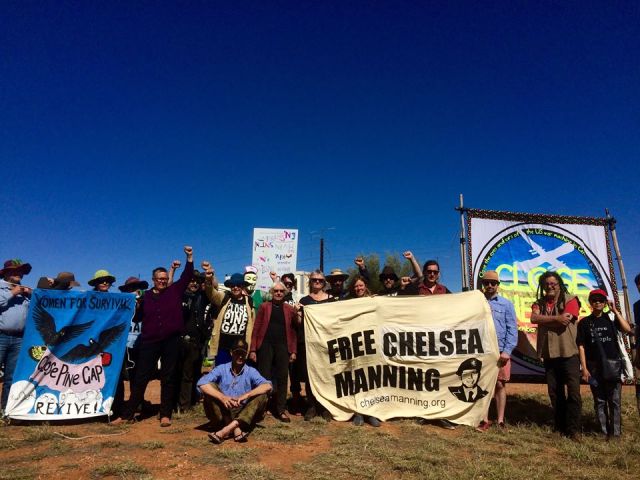
Beginning on September 26, International Day for the Total Elimination of Nuclear Weapons, hundreds of peace activists converged on the Pine Gap Joint Defence Facility, less than 20 kilometres from Alice Springs, to expose its role in war, surveillance and nuclear targeting.
A week-long protest camp and following conference was held on the 50th anniversary of the founding of Pine Gap to discuss the role of the highly secretive facility in drone targeting, mass citizen surveillance and preparations for nuclear war.
Pine Gap is one of the largest and most important US war fighting and intelligence bases in the world. The murder of individuals by US drone-based weapons, outside national and international law, is organised through the signal collection operations of Pine Gap.
US bases on Australian soil assist the US to perpetrate wars against countries in the Asia-Pacific region and beyond and help swell the list of Australia’s enemies. Pine Gap is the most likely Australian target in the event of a nuclear war involving the US, immediately jeopardising the 25,000 residents of Alice Springs and others in the path of radioactive fallout.
Activists held a series of events in the week leading up to the Independent and Peaceful Australia Network (IPAN) conference — from “Brunch not Bombs” at the gates to Pine Gap, to a Community Bike Ride from Alice to Pine Gap, to Lamentations in Landscape, a series of participatory theatre performances in the landscape around Pine Gap, lamenting the sorrows of war and imperialism.
A light was shone on Raytheon, a defence contractor in Alice Springs that provides the satellite navigation, laser guidance, high-definition radars, advanced seekers and other technologies used at Pine Gap. Six “peace pilgrims” walked on to the Pine Gap base at night to lament the death caused by the base and to resist the violence that is perpetrated there.
Two camps were home to peace activists for the week. The Healing and Unity camp was hosted by the Arrernte people, whose aim is to close Pine Gap in an act of healing and cultural co-creation. This was held in conjunction with the Women for Survival Revive camp, as a place to remember and revive the spirit of the 1983 Women for Survival camp, when 800 woman came to Pine Gap. The Disarm Protest camp was organised as a non-hierarchical, grassroots and decentralised campaign to assert a call for peace.
On September 28 peace activists blockaded the road to Pine Gap and declared their solidarity with imprisoned whistleblower Chelsea Manning.
Just before the peace convergence, a UN working group on nuclear disarmament issued a breakthrough recommendation for the General Assembly to convene a conference in 2017 to negotiate “a legally binding instrument to prohibit nuclear weapons, leading towards their total elimination”.
Austrian Foreign Minister Sebastian Kurz announced on September 21 that Austria, along with other UN members states, will table a resolution at the General Assembly First Committee in October, seeking a mandate for negotiations to begin next year.
“For 71 years the majority of countries have experienced the injustice and insecurity that nuclear weapons represent,” said Ray Acheson of the Women’s International League for Peace and Freedom. “With negotiations of a ban treaty on the horizon, we are as close as we have ever been to effectively challenging the continued possession of these weapons of mass destruction.”
Gem Romuld from International Campaign to Abolish Nuclear Weapons (ICAN) Australia said: “When a treaty banning nuclear weapons is negotiated, Australia will be expected to sign it, as it has signed treaties to outlaw other abhorrent weapons. To enable Australia to sign on, the functions of Pine Gap should exclude preparations for nuclear war. This facility has served to implicate Australia in nuclear aggression and as a prime nuclear target for 50 years too long.”
Like the article? Subscribe to Green Left now! You can also like us on Facebook and follow us on Twitter.